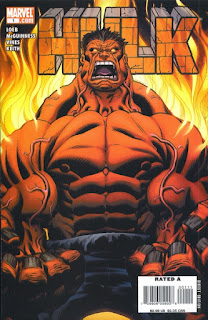One of the best side effects of
"The Avengers" movie being a mega-hit worldwide is that people are starting to think the Hulk is kind of cool again.
Mark Ruffalo's witty, tense performance as
Bruce Banner just about steals the movie out from under many other flashier characters, and for the first time, the Hulk himself seems "right" on screen. Like many, I hated
Ang Lee's ponderous and misguided 2003 film, and while I enjoyed 2008's
"Incredible Hulk" with Edward Norton, there was still something missing from it.
"Avengers" and geek-god writer Joss Whedon figured it out - the Hulk had no real character on screen previously. For 50 years in comics, the Hulk has often been a funny, touching character. The "Avengers" Hulk gives us some of that movie's funniest, and scariest, moments, and looks about as realistic as an 8-foot-tall green muscle man really could. Unlike the last two Hulk movies where the Hulk was basically a CGI Godzilla, in this one we spend enough time with Bruce Banner to truly see him within the Hulk when the moment comes.
I used to think the Hulk was a lame character when I was a young comic-collecting Marvel fanboy. The whole "Hulk smash" and Banner as whiny cursed nerd thing just seemed cliched and boring. Yet I've long since changed my mind and these days I'd rank Bruce Banner as quite possibly Lee and Kirby's second-greatest Marvel creation, just after the Fantastic Four.
I just recently picked up Marvel's new
"Hulk: Pardoned" collection, which reprints a huge swag of comics by the great
Bill Mantlo from the early 1980s, which contained a story that shook up the whole "Hulk smash/Banner whine" paradigm forever. Mantlo (who was
tragically brain-damaged in 1992 in an accident) might just be the most influential writer the Hulk ever had. "Hulk: Pardoned" is the start of an epic 30-issue storyline that ran from
"Incredible Hulk" #270-300 or so, where for the first time Bruce Banner gains extended control of the Hulk's body and becomes "the smart Hulk."
Mantlo's writing is really underrated - it's not flashy like Alan Moore or Frank Miller were in the 1980s, so he never quite got the respect he deserved, but for mainstream superhero comics, Mantlo was one of the best at quietly filling in character and depth amongst the smashing. In "Hulk: Pardoned," we find the genius Banner dealing with the power and freedom of being in control of the Hulk for the first time, along with its pitfalls.
One of the key things Mantlo established about Bruce Banner is that the Hulk's fierce rage and animal nature isn't some "other personality" but very much Banner's dark side, the legacy of a childhood filled with abuse (a key bit of Banner's back story Mantlo also added to the character). While Ang Lee fumbled horribly trying to illustrate this sad past in his labored "Hulk" film, in "Avengers" Mark Ruffalo manages to brilliantly distill this down to just one single, crowd-pleasing line in the final confrontation scene, as he answers an earlier question about how he "lives" with the Hulk inside him:
Steve Rogers: Doc... I think now is the perfect time for you to get angry.
Bruce Banner: That's my secret, Cap. I'm always angry.
Mantlo's writing on the "Hulk" gave a character that was beginning to seem a bit tired a new life. The extraordinary 150-issue run by writer
Peter David that followed shortly after Mantlo's is probably the best the character's ever been, and largely indebted to Mantlo. David opened the door further for alternate manifestations of the Hulk/Banner duality -- you got the cunning, feral "Grey Hulk," another kind of smart Hulk with "Professor Hulk," and much more. Bruce Banner's head is filling with alternate personalities and manifestations, and while invariably his life turns to crap, Mantlo showed us how many permutations his story could have. More recently, there's been a surfeit of great Hulk comics with the
"World War Hulk" miniseries (what happens if a smart but violent Hulk declares war on mankind?) and
Jeff Parker's excellent "Red Hulk", which features another key supporting character becoming a 'Hulk' himself and doesn't feel like scraping the bottom of the Hulk barrel at all.
The genius with a tortured dark side isn't a new idea at all - Dr. Jekyll and Mr. Hyde are a big influence in Lee and Kirby's original "Hulk" tales. But as "Avengers" shows, the man with a raging, constraint-free id inside is still a very potent character. And the reason Ruffalo's Hulk is such a crowd-pleasing character is partly because Hulk smashing stuff up is always cool, but also because "Avengers" smartly makes Hulk a relatable hero as well, which the previous two Hulk movies never really managed to successfully do.





































